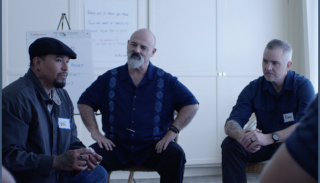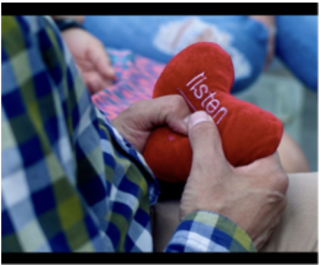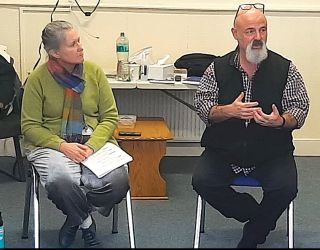Loneliness
Using the Empty Chair to Move Beyond Us-and-Them Thinking
In a season of vitriol, council with an empty chair may help us all win.
Updated April 23, 2024 Reviewed by Gary Drevitch
At the 2012 Republican National Convention, Hollywood icon Clint Eastwood did something unusual: he spent over 12 minutes speaking to an empty chair as if it were then-President Obama. Commentary flooded social media and dominated news headlines for days. Politicos and pundits called it “absurd,” “strange,” and “weird,” and later, even Eastwood called his actions “silly.” At the time, I agreed, but 12 years later, I have a different perspective. Because today, that “silly” stunt may be part of the societal salve we need.
Whether cheering on our football team or our candidate, it’s normal to want “us” to win and “them” to lose.
As a species that relies on community, we’ve evolved, in part, thanks to our ability to work collaboratively, and we’ve built a society that more than meets the needs once scarce to our tribal ancestors. That doesn’t mean we no longer need one another; we do. But a growing political division bolstered by faulty “us vs. them” thinking infers otherwise. This is shaping the U.S. into a country far from united with potentially dangerous consequences.
While the 2020 election and subsequent Insurrection proved contentious, severing relationships among friends, families, and communities, four years later, it’s only gotten worse. According to Surgeon General Vivek Murthy, Americans today suffer from an epidemic of loneliness and isolation, which profoundly affects mental and physical health. This includes a 29 percent increased risk of heart disease, a 50 percent increased risk of developing dementia (for older Americans), and, most devastatingly, a 60 percent increased risk of premature death.
It doesn’t have to be this way.

Beyond us and them
According to Jared Seide, Founder and Executive Director of the nonprofit Beyond Us & Them, engaging in an age-old practice can help. At the heart of this practice is a devised social structure he calls “council.” Not to be confused with “counseling” or therapy, “council” is a concept that has been utilized across cultures throughout history.
Seide’s first council experience in the mid-1990s proved life-changing. “In the post-Rodney King era, my daughter’s Los Angeles-based school was falling apart. Many school community members were justice-system impacted, and tensions were high,” he said. “The practice of council was introduced, and the whole community engaged, and soon, transformed.” Shifting his career path shortly after, Seide has been working to expand that blueprint for nearly 30 years, introducing the concept of the council to other schools and community-based organizations.

Today, Seide is joined by over 40 staff who steward Council through the nonprofit, Beyond Us & Them. The concept has been successfully adopted across diverse community populations, including teachers, inmates, law enforcement agencies, and healthcare providers. Regardless of the participant base, the format is the same: A small group of individuals are seated in an open circle with one empty chair. The council works through a 32-hour curriculum developed by Seide, which includes reflection exercises and instruction in techniques such as meditation and mindfulness. Council schedules vary; some meet one hour per week for 12 weeks, augmented with homework, while some opt for a 32-hour intensive session over four days. Led by a facilitator, each member takes turns sharing or responding to a prompt. Opinions aren’t allowed, and interrupting and cross-talk are discouraged.
Each council convenes by addressing the empty chair and asking, “Who isn’t here?”
Doing this helps identify who each individual or the group views as “them.” The empty chair might represent a power structure, such as “management” or “law enforcement,” or, more personally, someone the participant has hurt. While this may raise a few eyebrows at first, the exercise is an important part of the process that helps to bridge differences and build connections.
The empty-chair exercise is, in part, inspired by the therapeutic modality known as gestalt therapy. Developed by Fritz Perls, a psychiatrist and psychoanalyst, and his then-wife, psychotherapist Laura Perls, it gained notoriety in the 1940s and 1950s. Intended to resolve the conflicts and ambiguities that result from a failure to integrate parts of the personality, gestalt's founders used it to teach individuals how to become aware of sensations in their body and within their environment so that they could respond healthily. Ultimately, it aims to teach self-regulation, a vital skill for relationship building and perhaps an overlooked first step to relational restoration.
A safe space to be seen and heard is paramount to healing
Researchers studying participants in the “Council for Insight, Compassion & Resilience” program for incarcerated individuals found significant positive changes in socio-cognitive functioning. This included pronounced reductions in physical and verbal aggression and marked increases in social connectedness, mindfulness, and resilience. Beyond social connection, findings across council programs reflect immediate and long-term emotional, psychological, and physical improvements in overall health. This is marked by better sleep, medication reduction, weight loss, lower blood pressure, reduced inflammation, and heart rate variability.
Seide's wife, Ann Seide, is an internist and integrative medicine doctor who serves as medical adviser to the Board. Commenting on the benefits, Dr. Seide says, “What we’re seeing are shifts in the nervous system."
A noteworthy byproduct is increased compassion. Seide adds that, in Council, "we experience self-compassion and in that, also learn that compassion is something we can embody, not something ‘done’ to someone.” Internalized this way, compassion appears to be a mini but mighty tool hiding in plain sight.

This isn’t to suggest you begin a council with your arch-nemesis or gather with those who have inflicted harm. Seide advises “bonding before bridging” and suggests starting small. “Commit to meaningful connection with your family, listen without judging, and watch what happens .... When we have permission to be vulnerable, we can build trust, and then we come together, and that’s where the real magic happens.”
As we turn toward November, I hope that we can commit to being better listeners and practicing compassion and that in the sum of those acts, we will all benefit. Not only in restoring connection with one another but also in reconnecting with what President Lincoln called "the better angels of our nature."
Until we do, our union may continue to devolve, and the consequences of the Surgeon General’s warning only grow more dire.
References




